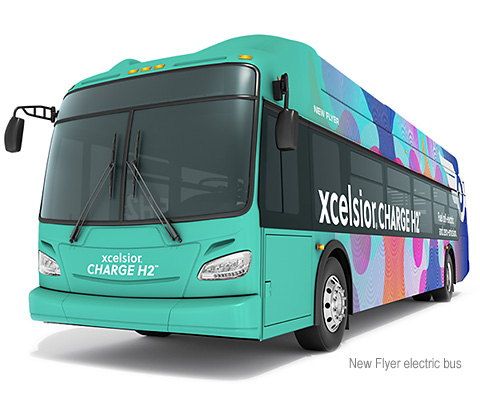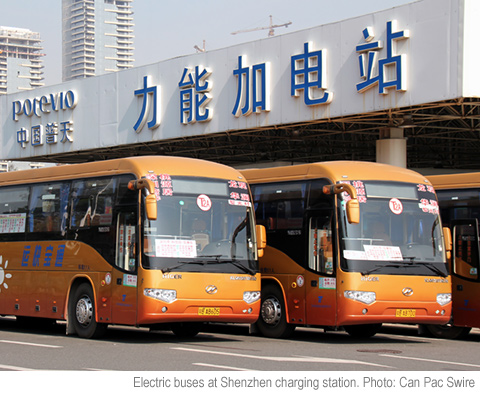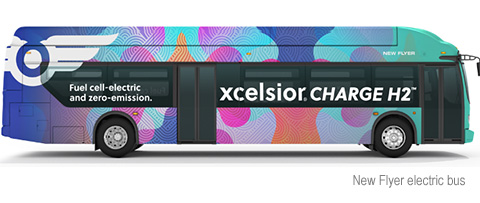
Electric buses are making a real—and rapidly growing—dent in emissions: as Bloomberg reported, electric buses will displace 270,000 barrels of diesel a day by the end of this year. But despite being home to four prominent electric bus manufacturers, Canada’s transit fleets have been slow to adopt this climate-change-fighting technology, lagging behind others around the world.
It’s a missed opportunity to both cut carbon pollution and support our growing electric bus companies—like Quebec’s Lion Electric and Vancouver’s GreenPower—by creating a stronger market for them at home.
Canada has relatively few electric buses on its roads—especially compared to the 16,359 fully electric buses in Shenzhen, China, or even compared to the approximately 100 electric buses in L.A.—but there are signs of leadership at home. Montreal, for example, has committed to providing 100% zero-emission transit by 2040.

For now, many Canadian electric buses are sold to California, leading Canadian companies to open manufacturing facilities abroad rather than in Canada.
Canada is lucky to have a handful of innovators in this space building the next generation of buses, but we’re also at risk of falling behind other countries. Supporting electric buses is about more than just cutting pollution—though that’s a big one. It’s also about saving money in the long run, being healthier, and helping our homegrown manufacturing industry become competitive on a global scale. Now what we need is leadership at all levels of government, so that Canadians don’t miss the bus.

Though it is just a start, the $2.2 billion in Canada’s 2019 federal budget earmarked for infrastructure funding—including transit—is an opportunity to accelerate Canada’s transition to electric buses.
More policies to encourage electric buses in Canada would not only help us fight climate change but also create opportunities to save money in the long run. Electric buses have many advantages, not the least of which are significant fuel, environmental, and health cost savings, helping offset higher—but quickly falling—upfront costs.
Key Facts:
- 13% of the world’s bus fleet is already electric.
- Over 99% of the world’s electric buses are in China.
- Sales of electric buses increased by 40% between 2016 and 2017.
- By 2030, an electric bus will be the same price as a diesel bus, while also saving hundreds of thousands on fuel costs over the bus’s lifetime, according to Bloomberg New Energy Finance.
- There are four electric bus manufacturers in Canada: GreenPower Motor Company, The Lion Electric Company, New Flyer Industries, and Nova Bus.
 Clean Energy Canada’s new report Will Canada Miss the Bus? delves into the current use of electric buses in Montreal, Toronto, Edmonton, Vancouver and compare that to Los Angeles, Amsterdam, and Shenzhen. It explores the opportunities electric bus presents for Canadian manufacturers, transit operators, and riders. It’s up to Canada’s transit providers, cities, and governments to get on board and not miss the bus.
Clean Energy Canada’s new report Will Canada Miss the Bus? delves into the current use of electric buses in Montreal, Toronto, Edmonton, Vancouver and compare that to Los Angeles, Amsterdam, and Shenzhen. It explores the opportunities electric bus presents for Canadian manufacturers, transit operators, and riders. It’s up to Canada’s transit providers, cities, and governments to get on board and not miss the bus.
